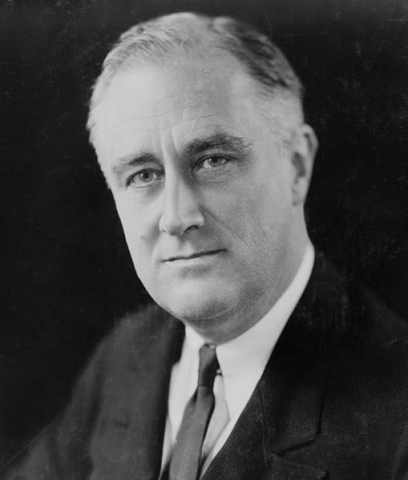 |
Franklin Delano Roosevelt (FRANK ln DEL uh no RO zuh velt) known as "FDR" was a descendant of Theodore Roosevelt, his fifth cousin, who had been the 26th President of the United States.
He was the only child of James and Sara Roosevelt. His father was 26 years older than his wife Sara, who was 28 years old when Franklin was born. She was very strict with their son, but both parents loved him very much. They took him on trips to Europe with them, and instead of attending school, Franklin was taught by private tutors.
When he was 14 he went to a preparatory school, and upon finishing high school he attended Harvard where he graduated. Next he went to law school at Columbia University.
While he was at Harvard he made contact with his distant cousin, Eleanor whom he had known as a child. She was rather plain-looking, but she had a brilliant mind, and this attracted Franklin to her. His mother opposed the marriage and constantly interfered. In fact while they couple was on their honeymoon Sara rented a house and fully furnished it to suit her own tastes. Through the years her interference caused Eleanor a lot of grief.
They had six children, but one of their sons died as an infant. Roosevelt was a good father and engaged in many sports and activities with his children.
His political career began at the age of 29 when he became a U.S. Senator from New York. He ran for Vice-President in 1920 on a ticket with James Cox, but they lost the election to Herbert Hoover.
The next year a terrible thing happened to him. He became ill with polio * , a disease which attacks and cripples the body. He became partially paralyzed. He fought hard to overcome the disease and regained the use of his hands, but he would never be able to walk again without help. Swimming in warm water seemed to help his legs.
Some thought his career was ended, but with his determination he proved them wrong. He was elected governor of New York, then in 1932 he was elected President of the United States.
The country was in an economic depression * . People could not get jobs, and families were suffering. Men stood in bread lines to get food. People lost their homes, and farmers lost their farms.
Three weeks after he took office there was a banking crisis. People began to be afraid and drew their money out of the banks. The banks were running out of money. Roosevelt declared a "bank holiday" and closed all the banks until the accounting books could be examined. The financially sound banks were given money by the government to reopen, but the banks in financial trouble remained closed.
He was the only child of James and Sara Roosevelt. His father was 26 years older than his wife Sara, who was 28 years old when Franklin was born. She was very strict with their son, but both parents loved him very much. They took him on trips to Europe with them, and instead of attending school, Franklin was taught by private tutors.
When he was 14 he went to a preparatory school, and upon finishing high school he attended Harvard where he graduated. Next he went to law school at Columbia University.
While he was at Harvard he made contact with his distant cousin, Eleanor whom he had known as a child. She was rather plain-looking, but she had a brilliant mind, and this attracted Franklin to her. His mother opposed the marriage and constantly interfered. In fact while they couple was on their honeymoon Sara rented a house and fully furnished it to suit her own tastes. Through the years her interference caused Eleanor a lot of grief.
They had six children, but one of their sons died as an infant. Roosevelt was a good father and engaged in many sports and activities with his children.
His political career began at the age of 29 when he became a U.S. Senator from New York. He ran for Vice-President in 1920 on a ticket with James Cox, but they lost the election to Herbert Hoover.
The next year a terrible thing happened to him. He became ill with polio * , a disease which attacks and cripples the body. He became partially paralyzed. He fought hard to overcome the disease and regained the use of his hands, but he would never be able to walk again without help. Swimming in warm water seemed to help his legs.
Some thought his career was ended, but with his determination he proved them wrong. He was elected governor of New York, then in 1932 he was elected President of the United States.
The country was in an economic depression * . People could not get jobs, and families were suffering. Men stood in bread lines to get food. People lost their homes, and farmers lost their farms.
Three weeks after he took office there was a banking crisis. People began to be afraid and drew their money out of the banks. The banks were running out of money. Roosevelt declared a "bank holiday" and closed all the banks until the accounting books could be examined. The financially sound banks were given money by the government to reopen, but the banks in financial trouble remained closed.
 WPA workers in 1939 | Roosevelt knew he had to do something to help his countrymen survive the economic crisis. He implemented "The New Deal". He created jobs for people building roads, bridges, and schoolhouses. They even paid people to clean up the parks and do odd jobs. The economy gradually began to recover. |
No comments:
Post a Comment